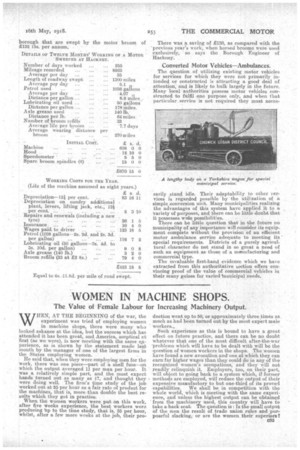WOMEN IN MACHINE SHOPS.
Page 13

If you've noticed an error in this article please click here to report it so we can fix it.
The Value of Female Labour for Increasing Machinery Output.
WHEN, AT THE BEGINNING of the war, the experiment was tried of employing women in machine shops, there were many who looked askance at the idea, but the success which has attended it has been great, and America, sceptical at -first (as we were), is now meeting with the same experience, as is shown by the statement made las_t month by the manager of one of the largest firms in the States employing women. He said that, when they were employing men for the work, there was one piece—part of a shell fuse—on which the output averaged 11 per man per hour. It was a relatively simple part, and the most expert hands turned out as many as 17, and thought they were doing well. The firm's time study of the job worked out at 35 per hour as a fair rate of product for the machines, that is, more than double the best results which they got in practice. When the women workers were put on this work, after five weeks experience, the best workers were producing 'up to the time study, that is, 35 per hour, whilst, after a few more weeks at the job, their pro
duction went up to 50, or approximately three times as. much as had been turned out by the most expert male workers..
Such experience as this is bound to have a great effect on future practice, and there can be no doubt whatever that one of the most difficult after-the-war 'problems which will have to be dealt with will be the question of women workers in the shops. The women have found a new avocation and-one at which they can earn far higher wages than they could do in any of the recognized women's occupations, and they will not readily relinquish it. Employers, too, on their part, will object to going back to a system which, if former , methods are employed, will reduce the output of their expensive manufactory to but one-third of its proved capabilities. We shall be in competition with the whole world, which is meeting with the same experience, and unless the highest output can be obtained ' from the machinery used, this country will have to take a-back seat. The question is : Is the small output of the men the result of trade union rules and purposeful slacking, or are the women their superiors? 035






















